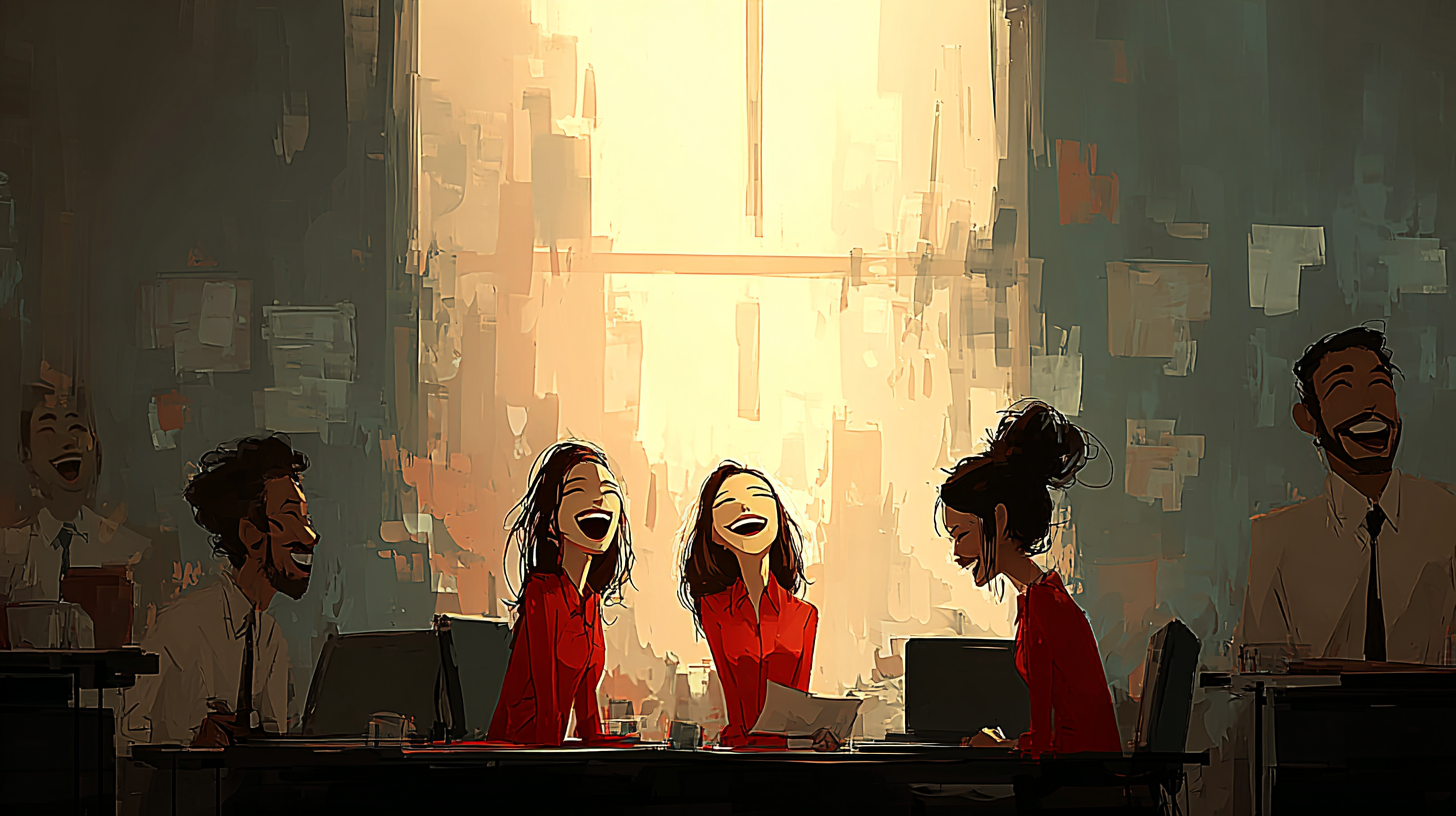“Laughter” means the sound people make when they are happy or find something funny.
「laughter」は人が楽しい時やおかしい時に出す「笑い」のことです。
以下は英単語 “laughter” に関するストーリー型学習コンテンツです。まずは大枠の意味を理解して最後の文章で確認しましょう。
主な意味(main meaning)
| 品詞 | 意味 | 発音記号 | 英語例文 |
|---|---|---|---|
| 名詞 | 笑い、笑うこと | /ˈlæf.tɚ/ | Her laughter filled the room and made everyone smile. |
語源(etymology)
「laughter」は古英語「hlahtor」から来ており、「laugh(笑う)」に由来します。根本のイメージは「声を出して笑うこと」です。
類義語(synonyms)
| 類義語 | 英語例文 |
|---|---|
| giggle(くすくす笑い) | The children started to giggle during the story. |
| chuckle(くすっと笑う) | He gave a soft chuckle after hearing the joke. |
| roar(大笑いする) | The audience roared with laughter at the comedian’s joke. |
| snicker(クスクス笑う) | She tried not to snicker during the serious meeting. |
反義語(antonyms)
| 反義語 | 英語例文 |
|---|---|
| silence(沈黙) | There was complete silence after the announcement. |
| crying(泣くこと) | His crying could be heard from the next room. |
コロケーション(collocations)
| コロケーション | 英語例文 |
|---|---|
| burst into laughter | The class burst into laughter when the teacher told a joke. |
| uncontrollable laughter | We were in uncontrollable laughter during the funny movie. |
| laughter filled the room | The laughter filled the room and created a joyful atmosphere. |
| cause laughter | His silly dance caused laughter among the children. |
2項表現(binomials)
| 2項表現 | 英語例文 |
|---|---|
| laughter and joy | The party was full of laughter and joy. |
| fun and laughter | Their friendship was always full of fun and laughter. |
英語ストーリー(english story)
Title: The Office Prank
It was a usual Monday morning at the office. Everyone was a bit sleepy and quiet. Then, something unexpected happened. As soon as Mr. Tanaka opened his drawer, a toy snake jumped out. He screamed, and then… burst into laughter.
His loud laughter filled the room, and soon everyone else started laughing too. Even the boss couldn’t stop his chuckle. It turned out that Yuki, the intern, had placed the toy snake in Mr. Tanaka’s drawer as a joke.
“That was a good one!” said Mr. Tanaka with a big smile. “You caused a lot of fun and laughter today.”
“I just wanted to bring some joy and laughter to the office,” Yuki said.
For the rest of the day, people were smiling and joking. It was amazing how a simple prank changed the mood of the entire office.
Even during meetings, small giggles could be heard. “Be careful,” said the boss jokingly, “or Yuki will get you next!”
In the end, everyone agreed: a little laughter can go a long way.
和訳
タイトル:オフィスのいたずら
それはいつもの月曜日の朝だった。オフィスは少し静かで、みんな眠そうだった。そんな時、思いがけないことが起きた。田中さんが引き出しを開けた瞬間、おもちゃのヘビが飛び出してきたのだ。彼は叫び、そして… burst into laughter(突然笑い出した)。
彼の大きな**laughter(笑い声)が部屋いっぱいに広がり、すぐに他の人たちも笑い出した。上司でさえchuckle(くすくす笑い)**を止められなかった。
実は、インターンのユキがその引き出しにおもちゃのヘビを仕込んでいたのだった。
「すごく良かったよ!」と田中さんは笑顔で言った。「今日はたくさんの**fun and laughter(楽しさと笑い)**を起こしてくれたね。」
「ちょっとでも**joy and laughter(喜びと笑い)**をオフィスに届けたかったんです」とユキ。
その日一日、みんな笑顔で冗談を言い合っていた。小さないたずらがオフィスの雰囲気をこんなに変えるなんて、驚きだった。
会議中でさえ、**giggle(くすくす笑い)**が聞こえた。「気をつけて」と上司が冗談で言った。「次はユキに仕掛けられるぞ!」
結局みんなが認めた。「少しの**laughter(笑い)**が、すごく大きな効果をもたらすんだね。」
Q&A
- Qgiggle と laughter の違いは?
- A
「giggle」は主に高くて軽い「くすくす笑い」を意味し、子どもや女性が控えめに笑うときに使われます。一方「laughter」はもっと広い意味を持ち、声を出して笑うこと全般(静かでも大声でも)を指します。
- Qchuckle と laughter の違いは?
- A
「chuckle」は小さくて静かな笑いで、「くすっと笑う」という意味です。心の中でおかしいと思ったときに自然に出る笑いです。「laughter」は chuckle を含むすべての「笑い」の総称です。
- Qroar と laughter の違いは?
- A
「roar」は「どっと大笑いする」「爆笑する」という意味で、非常に大きな笑い声です。「laughter」はそのような笑いも含みますが、もっと一般的で音量の大小を問いません。
- Qsnicker と laughter の違いは?
- A
「snicker」は「クスクスと笑う」、特に誰かをからかったり、ひそかに笑うときに使います。「laughter」は前向きな笑いが多く、snicker には少し悪意や隠れた意味がある場合もあります。
- Qburst into laughter と laughter の違いは?
- A
「burst into laughter」は「突然笑い出す」ことを表す決まり文句です。感情の爆発的な反応として笑うときに使います。「laughter」はその後に続く「笑い」そのものを表します。
- Quncontrollable laughter と laughter の違いは?
- A
「uncontrollable laughter」は「止められない笑い」「笑いが止まらない状態」を意味し、程度の強さを強調しています。「laughter」はその状態を含めた全体的な「笑い」を表します。
- Qlaughter filled the room と laughter の違いは?
- A
「laughter filled the room」は「部屋中に笑いが広がった」という具体的な表現です。「laughter」はその「笑い」自体を指しますが、「filled the room」はその影響や雰囲気の広がりを描写しています。
- Qcause laughter と laughter の違いは?
- A
「cause laughter」は「笑いを引き起こす」「人を笑わせる」という意味です。何かがおかしくて人が笑うという因果関係を表します。「laughter」はその結果としての「笑い」です。
- Qfun and laughter / laughter and joy と laughter の違いは?
- A
これらは「laughter」を含む表現ですが、「fun and laughter」は「楽しさと笑い」、「laughter and joy」は「笑いと喜び」と、感情全体のポジティブな雰囲気を示す複合表現です。「laughter」単独よりも感情の広がりや雰囲気を強調します。



コメント